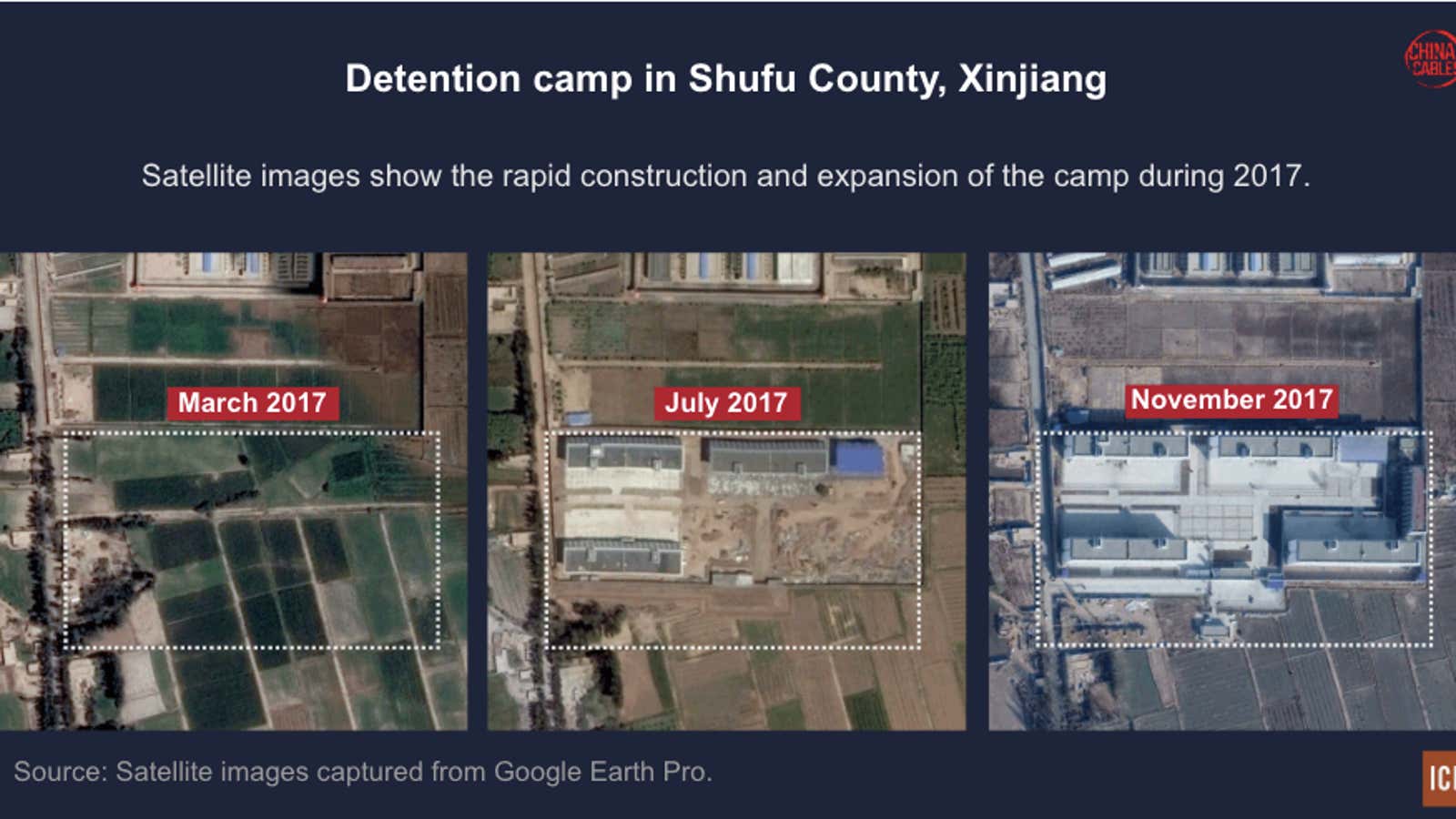Over six months in 2017, a group of fields in China’s restive Xinjiang region was turned into a massive, high-security building complex, replete with fences and guard towers.
After a year of haranguing by journalists and civil society groups, the region’s governor acknowledged the complex’s existence, but denied widespread reports they were detention camps for Uighurs, a largely Muslim ethnic group based in the region. Eye witnesses have reported guards using brutal forms of torture and rape, and people dying due to poor living conditions and lack of medical treatment. The BBC reports that around a million people are thought to have been detained in these facilities and elsewhere.
The governor, however, insisted the buildings were “professional vocational training institutions” aimed at de-radicalizing those suspected of extremist leanings.
That claim appears to have been thoroughly debunked by a series of internal government documents published on Nov. 24 by the International Consortium of Investigative Journalists (ICIJ) and dubbed “The China Cables.” The largest document, a nine-page manual signed by the region’s top security official, contains rigid orders on how to run the centers, which it says are part of the “‘three battles and one war’ struggle to fight against terrorism,” according to an English-language translation provided by the ICIJ.
The consortium said it obtained the documents “via a chain of exiled Uighurs” and confirmed their authenticity with the help of several experts, intelligence sources, and two people who knew the author’s handwriting.
The buildings are part of a years-long crackdown on the ethnic group, whose population numbers around 11 million. Tensions have spiked into violence by Uighur separatists, including riots in the region’s capital, Urumqi, in 2009, which killed around 200 people, most of them ethnically Han Chinese. Some Uighur separatists have allegedly committed violent attacks in Chinese cities.
The Chinese embassy in the UK told the Guardian, an ICIJ partner organization, that the reports were “pure fabrication and fake news.”
Locked up
The manual contains detailed instructions on how to prevent escapes by detainees, whom it refers to as “students,” describing the position trucks should be parked in, the need to “strictly manage and control” activities like toilet breaks, and installing “one-button alarms” and video surveillance that is “free of blind spots.”
Orders to “prevent trouble” decree that employees should “evaluate and resolve students’ ideological problems and abnormal emotions at all times,” and seem to suggest using undercover intelligence officers. “Roll out secret forces and bring information officers into play to prevent people from joining forces to cause trouble,” the manual reads.
“Teaching”
The actual brainwashing instructions begin with a focus on “de-extremification” by teaching detainees Mandarin:
Adhere to the daily concentrated study of the national language (Mandarin), law, and skills, make remedial Mandarin studies the top priority, and ensure time, content, and quality. When studying law and skills, lessons must be taught in the national language (Mandarin), and the national language (Mandarin) should be gradually used in daily life to communicate, to integrate “de-extremification” into national language (Mandarin) teaching.
A section on instilling “students” with correct ideology instructs officials to “promote the repentance and confession of the students for them to understand deeply the illegal, criminal and dangerous nature of their past behavior.”
A section on “manners” notes that students should learn “civility and courtesy, compliance and obedience” and the importance of hygiene. “Arrange bathing once or twice a week, to develop good life habits,” the document says. Darren Byler, an anthropologist and expert on Uighur culture, told ICIJ these orders come from a prejudice which holds that Uighurs are “backwards.” “It’s like the discourse about the savage ‘other’ or the uncivilized ‘other,’ where you need to teach them how to be civilized,” Byler said.
Arrested by AI
Four separate bulletins reveal how the government uses a mass data collection program to identify people it deems to be potential extremists. Its data sources include checkpoints, facial-recognition CCTV cameras, spyware that some Uighurs have had forcibly installed on their phones, and “Wi-Fi sniffers,” according to Human Rights Watch. It has also been monitoring an app called Zapya, which was developed by a Beijing-based company, has 450 million users worldwide, and is very popular with Muslims, ICIJ reports.
Authorities then use artificial intelligence to comb through that data and suggest people to detain, ICIJ reports. One bulletin reports that over seven days in June 2017, 15,683 Xinjiang residents who had been flagged by technology were rounded up and put in internment camps.
The ICIJ investigation follows a New York Times report earlier this month, based on 24 internal government documents, that showed president Xi Jinping personally ordering the crackdown in the region.
